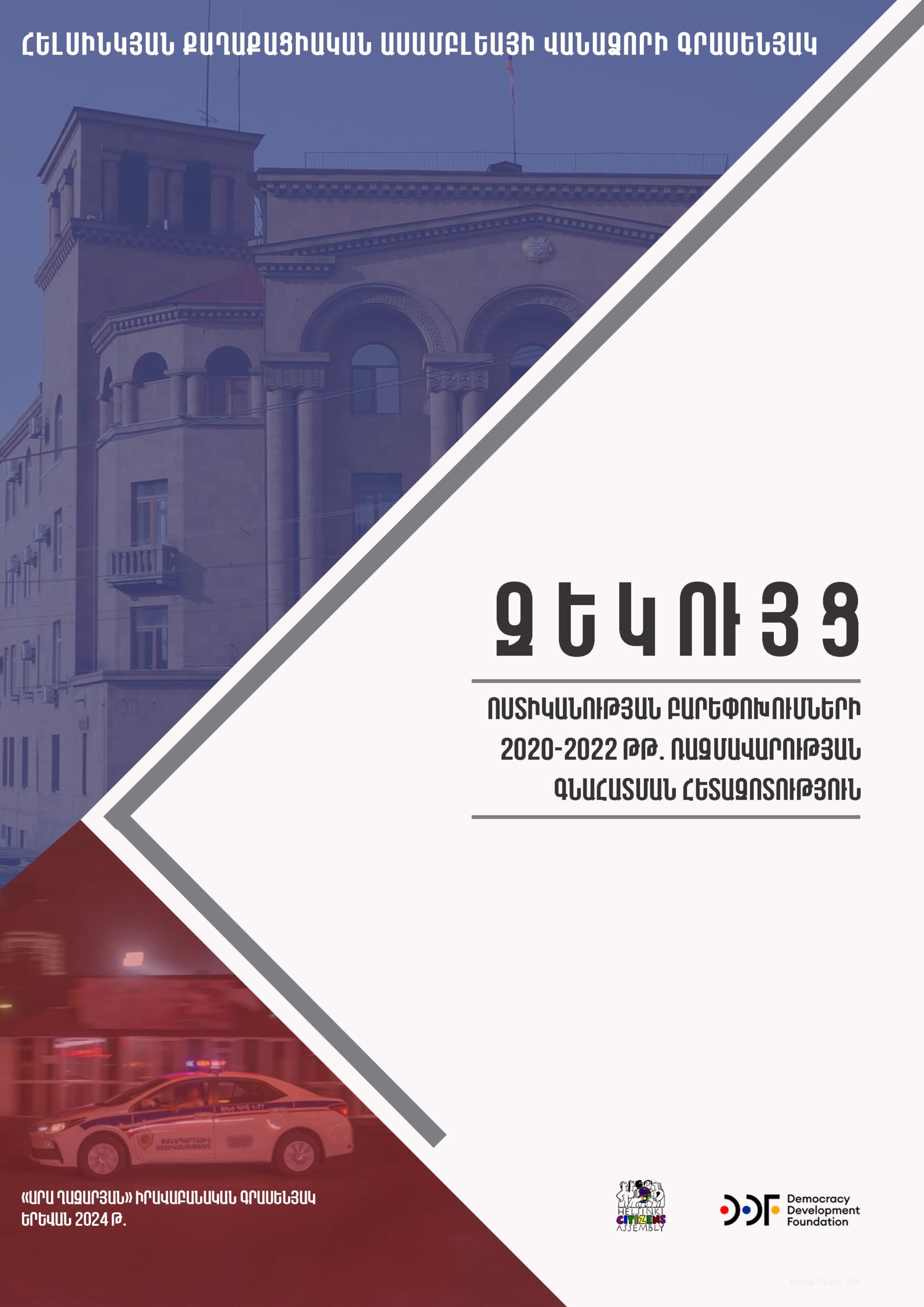The RA Police Reforms Strategy and its Action Plan for 2020-2022 envisage deep comprehensive changes in the Police system. Some of them have been implemented. A new ministry, namely, the Ministry of Internal Affairs, has been established, uniting
- the RA Police,
- Migration and Citizenship Service,
- Rescue Service.
Inclusion of the Police system in the MIA system gives an opportunity to bring the Police system to the parliamentary oversight field, which was not possible during the previous system, as the Police was formally not a part of the Government. This is an essential achievement necessary in a democratic society, in particular, to ensure two important features of effective governance, i.e., transparency and accountability. Nonetheless, there are no observable active processes of parliamentary management of the MIA. The National Assembly does not manifest activity and initiative in terms of exercising parliamentary oversight over the MIA activities. Parliamentary oversight mechanisms such as parliamentary hearings, inquiries, oral and written questions addressed to MPs, and oversight powers of temporary and standing commissions have been used in a limited and ineffective manner. While the NA Defense and Security Commission has had participation in discussions of legislative packages, the public does not have an opportunity to assess the volume, content and effectiveness of that participation, since parliamentary oversight of development of police reforms policies and legislation is not public enough.
One of the next directions of the reforms action plan for 2020-2022 is the establishment of an opportunity for the police system to be involved in criminal trial processes. Before 2014, a criminal jurisdiction authority operated within the Police system, which implemented criminal case preliminary investigation, while by July 2022 the Police performed the function of investigation into crime reports, which is, in essence, the initial stage of a criminal case investigation. However, after adoption of the Criminal Procedure Code in 2021, which entered into force in July 2022, implementation of that strategic concept became completely impossible in practice. A question arises in this context whether the strategy developers could not foresee in 2020 that in practice implementation of the strategic plan would be impossible in the conditions of new developments.
The next important strategic direction is the concept of community police reform, which proposed to optimize this sphere by exempting community police from a number of non-police functions, such as
- delivery of judicial notifications,
- accompanying detainees,
- assistance to organization of military training gatherings, etc.
However, the community police still continue to perform these functions. Nonetheless, it is envisaged to establish in the near future an interdepartmental working group to develop, within a short period of time, draft amendments to laws regarding transfer of non-police functions to other subdivisions. The strategy envisaged performance of community police functions by a multi-functional police, in the conditions of which it was proposed to transfer some community police functions to patrol or a different police service. However, a strategic decision was made that community police service should be performed independently and their functions shall not be transferred to patrol or any other police service. At the same time, it was decided to expand the community police powers and establish new powers for the community police to perform operational intelligence activity in crimes of minor and moderate gravity. Development of the final vision and concept of community police is underway. The vision was not envisaged under the Reforms Strategy for 2020-2022, and the lack of a clearly developed concept hinders implementation of reforms. This uncertainty is also conditioned by the fact that development of the 2024-2026 strategy is incomplete.
A draft law on Police Guards has been developed and envisages establishing a new police service with functions of protecting public order and ensuring public security, protecting state buildings and important objects, escorting state delegations, ensuring legal regimes of martial law and emergency state. The most important result of this draft will be the fact that police forces will partially stop being considered as a part of the armed forces, since according to the acting regulation, during martial law or war, police troops come under operational subordination of the command of the armed forces. This concept does not stem from Police objectives. Establishment of the MIA unified center of operative management is an important reform, as it is a centralized general platform for receiving and registering reports of crime.
Introduction of the integrity system in the MIA system is an important component of the strategic reforms. However, the work performed in this direction is in a transitional stage and there have not been enough activities performed yet. Currently there is no effective, modern and complete system of police integrity that will meet principles of the Law on Public Service, Corruption Prevention Commission, and international law. Substantial grounds in legislation concerning conduct of police officers and service investigation, as well as the current Disciplinary Code, need radical change. Decisions on disciplinary responsibility of police officers are not made public, which is why it is impossible to assess legality of those decisions. A police officer’s integrity is not examined during attestation, while it is specified in the regulating document. However, there are also positive trends. Integrity norms and principles are applied in the process of recruitment of police employees. Still, there is a lot of work to be done for the complete reform of the integrity system.
Read the report at https://hcav.am/wp-content/uploads/2024/03/police-22-24.pdf

